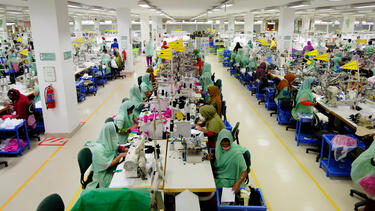Social Entrepreneurship
What Happens When Unions Bargain for Social Justice?
In a new study, Yale SOM’s James Baron and Daniel Julius examine the wave of unionization in museums, where workers often bring social-justice concerns to the bargaining table.

Where are the win-wins?
A step as simple as reducing the time that trucks idle can save money and cut emissions. An environmental advocacy group and a private equity firm have teamed up to uncover the sorts of efficiencies that further both of their missions.
What are the economics of happiness?
Economists have begun to use research into happiness to explore questions in economics, policy, and management. Betsey Stevenson of the Wharton School of the University of Pennsylvania surveys the work in this emerging field.
Can coffee help juice economic development?
A nonprofit is teaching business skills to East African farmers in order to let them enter the high-profit global market for specialty coffee. The project showed enough promise to get $50 million in underwriting from the Gates Foundation, and now aims to reach 180,000 growers. David Browning ’99 of Technoserve describes how to educate small-hold farmers to plug into the global market.
What is the for-profit social enterprise?
In a traditional model, for-profit companies strive to maximize returns for investors, while nonprofit organizations serve the public good. In recent years, a new model of for-profit social enterprise has emerged. Jon Carson '84, CEO of BiddingForGood, and Scott Griffith, CEO of Zipcar, bring their experience in the field to a discussion of the for-profit social enterprise ecosystem.
What do we owe the bottom billion?
Princeton philosopher Peter Singer has been a prominent, often controversial, figure. His utilitarian approach, focused on reducing suffering, has led him to argue for animal liberation and euthanasia. His most recent book, The Life You Can Save, looks at the responsibilities of individuals for addressing global poverty.
How does business value human rights?
As businesses have expanded beyond boundaries, they've exceeded the grasp of many national laws and norms. What standards should exist for how businesses affect people's lives? Christine Bader, advisor to the UN special representative of the secretary-general for business and human rights, discusses points of progress and remaining challenges.
How Has Globalization Benefited the Poor?
The lives of people in distant countries are increasingly being linked, through commerce, communications technology, or culture. Researchers are trying to parse out how the gains from globalization are touching the lives of the poorest citizens in developing countries.

Can international attention improve factory conditions?
With consumers becoming increasingly concerned about how their goods are produced, international companies are faced with managing conditions — as well as productivity — all along their supply chains. In many cases, that means finding ways to oversee factories in China.
What is Nollywood?
Nigeria’s film industry, often called Nollywood, produced 1,687 feature films in 2007. That’s more movies than were made in India and the United States combined. In a country that has suffered from decades of corruption and a failure to translate significant oil wealth into a higher standard of living for the majority of people, this homegrown enterprise has brought Nigeria a new sort of attention in recent years.
How can one country fight an epidemic?
Elizabeth Serlemitsos ’93 is chief advisor to the Zambian National AIDS Council, which is the government entity responsible for coordinating the country’s response to HIV and AIDS. The council works with international donors to develop and implement both private and public sector programs to combat devastating impacts of the disease.
